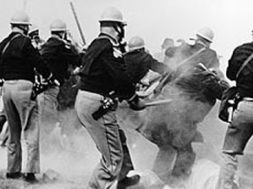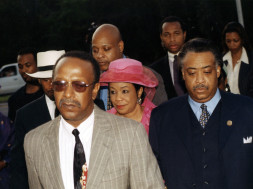
Hobbs’ Hump-Day Hot Points

By Chuck Hobbs, Esquire
I. Decline of the Dictators
Two weeks after Egyptian President Hosni Mubarak decided to step down from what was appearing to be a self styled “president for life” role (dictator) here we have Muammar Gadhaffi resurfacing from the shadows after years of being relatively quiet on the world scene.
For those of us alive in the 80’s the past few weeks have been a nostalgia trip: first there was the 25th anniversary of the Space Shuttle Challenger explosion, an event that provided my generation with its first “where were you when it happened moment”, followed by the100th birthday anniversary of Ronald Reagan, an avowed foe of Gadhaffi who, later in ’86, bombed the Libyan presidential palace in response to Ghadaffi’s support of terrorism.
The truth is that Ghadaffi will soon join the pantheon of dictators in decline, those, if we are to believe in the notion of Hell as defined by Dante, will occupy the seventh circle for violent offenders—the Hitler’s, the Pol Pots, the Idi Amin’s—and of course those of more recent vintage like Saddam Hussein, Slobodan Milosevic and with any luck, Ghadaffi, a man who has never met justice for being the shadowy figure behind the bombing of the German discotheque frequented by American soldiers in the 80’s and the blowing up of Pan Am flight 103 over Lockerbie, Scotland.
II. Speaking of Ronald Reagan
Perhaps no politician of the last thirty years has been as polarizing as Ronald Reagan. Conservatives love him and want to be him—while Liberals cast aspersions against his memory as frequently as possible. Reagan was so polarizing that when then candidate Obama praised Reagan’s legacy as a game changer on the campaign trail in ‘08, it widened a sense of mistrust that still has not quite abated with respect to those on the far left of the Democrat Party.
Still, it has become almost cliché to hail modern conservative leaders as the descendant of Reagan. This, again, is the case with respect to Wisconsin Governor Scott Walker, whose calm opposition to the thousands of Wisconsin citizens who are protesting his plans to tighten the state budget partially on the backs of state workers is making Walker a “rising star.”
Not to be outdone, Florida Governor Rick Scott is seeking to follow a similar path to reform in Florida and has recently taken to the airwaves to promote his belief in the same programs.
What these would be Reagan’s insouciantly forget is that Reagan was far from the right-wing ideologue that the Hannity, Limbaugh and others would have us believe. While I am sure that both governors are too busy to watch television, they both should watch the HBO special on Reagan—one that gives great insight into the complexities of a man who was not nearly as unflappable as his political descendants seem to be. Meaning, compromise, negotiation, and the ability to reason should not be viewed as cowardly ideas, rather, they are the building blocks of successful legislation and sound public policy.
III. Peaceful Protest
There is certainly a part of me that is proud to note that the protests that we see worldwide, from Egypt to Wisconsin, are following the blueprint set out by the Civil Rights Movement in the United States. Often, folks ask the question as to why Martin Luther King, Jr. is hailed as a national hero replete with a federal holiday.
Well, look no further than the peaceful protests which are bringing about meaningful change worldwide—with more sure to come. King’s non-violent philosophy, of course, was based upon the immortal words of the great transcendentalist Henry David Thoreau, whose seminal work “Civil Disobedience” also had a profound effect on Mohandes Gandhi. And we know that Gandhi’s own peaceful protests that sparked independence in India in the 1940s had a profound impact on King, who was a senior at Morehouse College when Ghandi died in 1948.
Still, anyone who watches the Eyes on the Prize documentary can attest that the grace that Dr. King and lieutenants showed in the face of being beaten by the very law enforcement officers that were supposed to protect them, being doused by water hoses and bitten by dogs, and living with the specter of death on a daily basis, those images are indelibly etched into the minds and hearts of modern protesters and it remains a key cog in illuminating suffering and wrongdoing or to redress grievances promulgated by the governmental powers that be.
IV. Snitches Get Stitches
Ok, I am no fan of the “Stop Snitching” movement that spread like wildfire a few years ago in urban areas where a few ignorant degenerates were trying to influence folks in urban areas not to cooperate with law enforcement in the investigation of murders and drug dealing. In this respect, I believe that those who “snitch” are actually courageous in eliminating the ills that plague those communities.
In the realm of political movements, however, snitches, actually, are cowards. Consider Exhibit A: Ernest Withers, a photographer whose pictures of iconic civil rights leaders and events litter history books nationwide. Well, it appears that Withers supplemented his income from the federal government as a paid informant for the FBI. We have known for years that COINTELPRO, an acronym for Counter Intelligence Program, was the sinister J. Edgar Hoover’s method of infiltrating civil rights groups and seeking to neutralize them by branding them as communists and subversives.
Still, while watching CNN reporter Soledad Obrien’s “Pictures Don’t Lie” special on Withers, you could see the pain in the faces of movement icons like Dick Gregory and Andrew Young as they recounted the access that Withers had and the damage that he did by cooperating with the government. Like noted traitors Judas, Benedict Arnold and Vidkun Quisling, Withers’ name, too, will forever be linked to an individual who sells out his own for pecuniary gain and he, too, may eventually be found in the ninth circle of Dante’s Inferno which is reserved for traitors.
We may never really know the damage that Withers did considering that it has long been suspected that King’s alleged assassin, James Earl Ray, may have been working at the behest of the government. Well, it is often said that what is done in the dark will come to light so, prayerfully, we will one day know the truth about why King died prematurely at 39 years of age.








